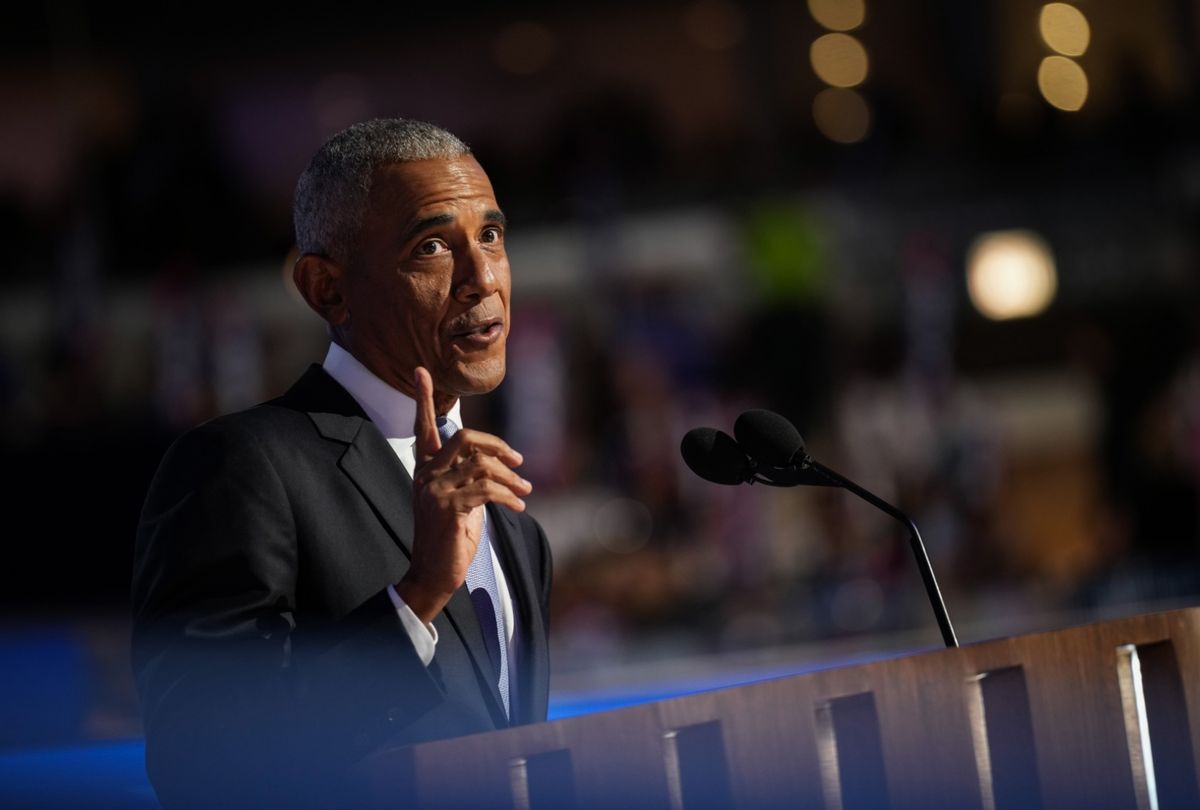Barack Obama, returning home to his political birthplace in Chicago for the Democratic National Convention, delivered an animated and forceful case for Vice President Kamala Harris as a worthy carrier of his political legacy and a proven leader who will help move the country "past some of the tired old debates that keep stifling progress.” Just two months ago, he might have been expecting to champion President Joe Biden for a second term in office; instead, he found himself declaring that "the torch had been passed" from "an outstanding president who defended democracy at a moment of great danger."
"Now it’s up to all of us to fight for the America we believe in," Obama said. "And make no mistake: It will be a fight.”
Obama, drawing from the the Harris campaign's economic messaging, argued that Harris doesn't just have plans for the future, but also an accomplished record to draw from. As California attorney general, he said, Harris "fought big banks and for-profit colleges“ and "helped take on the drug companies to cap the cost of insulin, lower the cost of health care and give families with kids a tax cut.” As president, he continued, she would be a leader who "actually cares about the millions of people all across this country who wake up every single day to do the essential, often thankless work: to care for our sick, to clean our streets, to deliver our packages."
Framing the work of supporting everyday Americans as a matter of "freedom," Obama pitched his party's idea of freedom as including "the freedom to breathe clean air and drink clean water and send your kids to school without worrying if they’ll come home." He also acknowledged that former President Donald Trump and the Republican Party believed in their own sort of freedom: the freedom in which "the powerful can do pretty much what they please, whether it’s fire workers trying to organize a union or put poison in our rivers or avoid paying taxes like everybody else has to do."
Obama rebuked the former president as a man of "bluster and bumbling and chaos" who cares only for himself. "It has been a constant stream of gripes and grievances that’s actually been getting worse now that he’s afraid of losing to Kamala. There’s the childish nicknames, the crazy conspiracy theories, this weird obsession with crowd sizes," he said, moving his hands closer together with a mockingly sheepish expression, as if to suggest that Trump might be concerned about the size of a far more personal attribute.
As a former president, Obama was guaranteed a prime-time speech at the convention, but he is also perhaps one of the Democratic Party's most potent messengers in its modern history. His oratory first electrified the Democratic convention in 2004, when he was a state lawmaker running for the U.S. Senate, and helped carry him to the presidency in 2008 after a mere four years in federal office. In that campaign, Obama leaned on a handful of leitmotifs to underscore his meaning: yes we can, change we need, the audacity of hope.
We need your help to stay independent
Halfway through the speech, the crowd he was speaking to dusted off one of those old phrases. As Obama described Harris as a president who would stand up for working-class Americans, convention attendees began to chant "yes she can," prompting the former president to crack a smile and repeat the phrase with them. Later, he touted the Affordable Care Act, which he signed into law in 2010, as an achievement that provided "millions of people access to affordable coverage" and said that Harris would continue to build on the existing protections.
"I’d noticed, by the way, that since it’s become popular, they don’t call it Obamacare no more," he added.
Former first lady Michelle Obama, a powerful speaker in her own right, also leaned into 2008 themes with pronouncements that "hope is making a comeback" in a speech that preceded her husband's on Tuesday night.
But for all his enduring popularity in the Democratic Party and his two convincing presidential election victories, the former president has not always succeeded in transferring his sheen to the people he's endorsed. Democrats suffered historic midterm losses in 2010 and 2014, and his energetic support for Hillary Clinton in 2016 was not enough to win her the presidency. Obama, wary of repeating a loss from what seemed to be pole position, acknowledged the hard road ahead.
“For all the incredible energy we’ve been able to generate over the last few weeks, this will still be a tight race in a closely divided country,” he said. “A country where too many Americans are still struggling and don’t believe government can help.”
Read more
about the Democratic National Convention



Shares